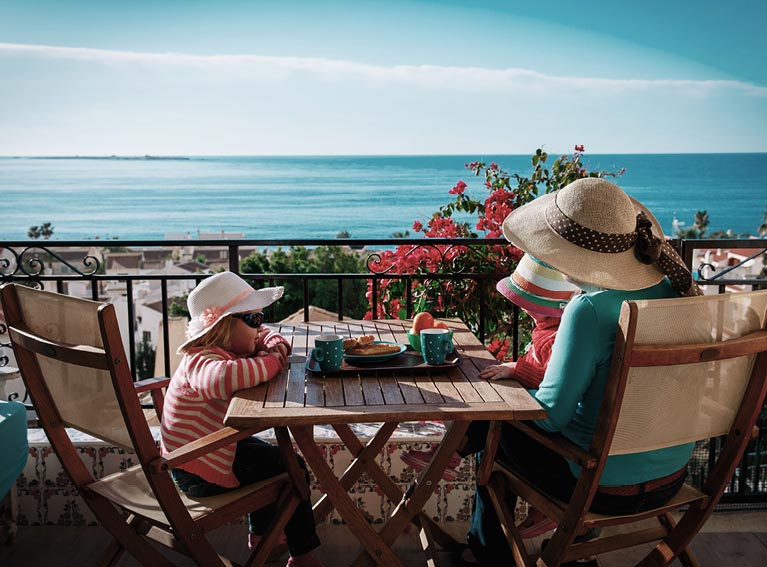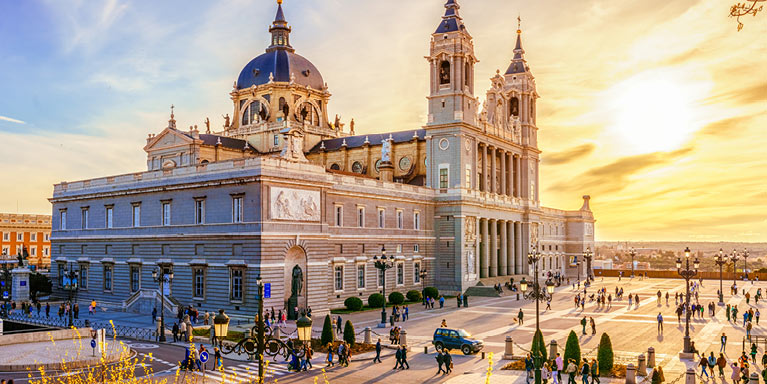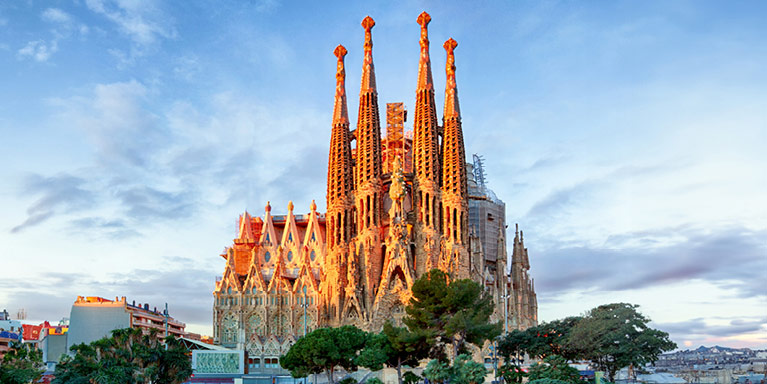
A guide to Spain
Our expert view on expat life in the Spanish sun

Spain has always attracted people from around the world to visit for their holiday, but those same reasons – sun, stunning cities with beautiful architecture and pace of life also make it an attractive proposition for expats. In fact, the huge tourist industry means there are lots of career opportunities for people from various working backgrounds. Learning the language will broaden your choices further and help you understand the bureaucracy and practicalities of living there longer term.
Spain offers a great work-life balance and is relatively affordable. It’s a good place to raise a family, with a wide range of leisure activities to keep the children entertained, wonderful beaches and countryside to enjoy all year round.
In this guide, we’ll look at the things that are good to know to help you settle quickly into your new life. And, if you’re thinking of moving abroad, we’ll be by your side as you embark on your latest adventure.
- Population: Over 48.5 million
- Currency: Euro (EUR)
- Capital: Madrid
- Biggest cities: Madrid, Barcelona, Valencia, Seville
- Main language: Spanish
- Main religion: Christianity
- Political system: Constitutional monarchy
- International dialling code: +34
- Emergency services: 112 (general)
- Driving: On the right
-
Careers
Spain has one of the largest economies in the world – with the tourist, automotive and renewable energy industries employing the most people. A lot of expats set up their own businesses in tourist areas, offering everything from language teaching to helping buy property.
The Spanish value being smartly dressed, and they like to build relationships – they prefer to work with people they know and trust. Management tends to be authoritative and firm, but generally kind and fair. Traditionally, business was dominated by men, but that is changing steadily.
A handshake is the most common business greeting, particularly at initial meetings. The air-kissing of both cheeks may come once you’re on more familiar terms. Business is largely conducted in Spanish with little to no English.
Business hours are usually from 9.00am to mid-evening, Monday to Friday, with a two-hour lunch break in the early afternoon. Gifts aren’t expected unless at Christmas or to celebrate a special occasion or successful deal. They should be good quality and opened in front of the giver.
Education
Schools are excellent in Spain and there’s plenty of choice. The academic year runs from mid-September to the end of June with the main holidays in June/July and December/January. School is free for children aged between 3 and 18 years (compulsory 6 to 16) and runs Monday to Friday.
There are four types of school in Spain. State/public schools, which teach in Spanish, are free apart from some books and extracurricular activities. Semi-private schools are subsidised by the government, with low fees and smaller classes, and follow the national curriculum. Private schools, both religious and secular, vary in terms of standards, facilities and fees – the most prestigious being very expensive – and usually teach English as a second language.
International schools are mainly found in the larger cities and most follow the British curriculum, with a few exceptions that study the American curriculum or the International Baccalaureate. Fees are usually high and there’s stiff competition for places.
-
Moving money
Putting the right banking arrangements in place is vital for expats around the world. You want to be able to access and transfer money easily, and with a bank you can trust to comply with international regulations. Most people have two banks – one in their home country and one local to where they’re living. But, if your bank has a global network, you may be able to set up an account ahead of your arrival, which gives you time to assess the financial market.
It’s important to understand how foreign exchange works and how fluctuating exchange rates can affect you. When you’re juggling finances in multiple currencies, remember that the currency markets can move quickly and make a big difference to the value of your money.
To help you reduce the risk of fluctuating currency, you could choose a foreign exchange that lets you fix an exchange rate for a fixed period. Then you’ll know exactly how much you need to convert, whatever happens in the market.
Budgeting
When you’re looking to move to a new country, you need to consider how a change in the cost of living could affect your finances. If you’re moving with your job, sometimes your employer may help with expenses, such as accommodation or school fees. Remember to account for setup costs, such as buying furniture and sorting insurance, when you’re thinking about your budget.
Costs
Some of our offshore accounts have a monthly fee, such as the International Current Account, whereas others, like the Premier International Account, don’t. Both offer fee free International Payments and 24/7 worldwide access, plus the Premier also includes worldwide travel insurance for you and your family. Terms and conditions apply.
Financial planning
While it’s going to be a busy time, it’s also worth setting some time aside to review your financial plans, such as whether you want to open any offshore accounts. They offer the convenience of keeping your money in one place so you can stay with the same bank no matter where life takes you.
Your expat status could give you new opportunities that weren’t available to you at home. However, tax rules differ from country to country, so if you’re unsure about your personal tax obligations, you should seek professional advice.
Lloyds Bank International Private Banking is by your side every step of the journey as you start your new life abroad. We offer international knowledge, experience and dedicated expert support to help meet all your financial needs. From savings to international payments and transfers, we can help you navigate the complex world of wealth management away from home.
Security
Offshore accounts are not protected by the Financial Services Compensation Scheme (FSCS), which protects savings up to £85,000 with authorised UK banks and building societies.
However, our accounts are covered by other schemes. The Jersey Bank Depositor Compensation Scheme, the Isle of Man Depositors’ Compensation Scheme and the Guernsey Banking Deposit Compensation Scheme offer protection for eligible deposits of up to £50,000.
Tax
The tax structure in Spain runs from 1 January to 31 December and the deadline for filing a tax return is 30 June. Individuals performing activities in Spain are subject to tax based on residence and source of income. Residents are taxed on worldwide income. Non-residents are taxed on Spanish income and on capital gains realised in Spain. Several tax exemptions may apply to expatriates. Married couples can file a joint return for all types of income and report the status of their dependent children.
Income derived by non-residents is generally subject to a final tax of 24% (19% for residents of other EU member states and EEA countries). However, other rates may vary depending on the type of income, such as dividends and other income derived from roles in a company, interest and other income received from assigning capital to third parties.
Individuals are considered residents for tax purposes if they spend more than 183 days in Spain per calendar year or if the centre of their vital interests is in Spain. A presumption of residence arises if an individual’s family lives in Spain. Under Spanish law, when meeting the criteria to be considered a Spanish tax resident, an employee assigned to Spain may elect to be subject to tax under the non-resident taxpayer rules, subject to certain conditions, such as:
- the individual must not have been a Spanish tax resident in the 10 years preceding their arrival
- the assignment in Spain is under a labour contract (local contract or assignment letter) except for a contract for a professional sportsperson
- the individual is a representative person of a company (without a participation in such company or with a participation in an unrelated entity)
- the individual can’t receive compensation deemed to be obtained by a permanent establishment in Spain.
Under this special tax regime, employment income up to 600,000 EUR is taxed at a rate of 24%, and employment income exceeding this amount is taxed at a rate of 47%. This is effective for the first year of residence and the following five consecutive years.
See www.agenciatributaria.es for further information.
Accommodation
There are plenty of affordable apartments and houses available to buy or rent – from high-rise tower blocks to spacious villas and village houses. Rental contracts are usually for six months or a year. You’ll probably have to pay a fee to the estate agent and a deposit of up to two months’ rent to the landlord. It’s worth checking what’s included before you move in – some might be advertised as furnished or unfurnished but have more or less than you would expect in terms of white goods.
If you’re looking to buy a property, it’s important to do your research and hire a decent lawyer and building surveyor. After that, the purchase process is usually quick and easy.
In terms of location, the capital Madrid has everything you could want in terms of sunshine, culture, nightlife and job opportunities. Barcelona is best known for Gaudi’s famous modernist architecture, football and beautiful beaches, but salaries tend to be a bit lower. Valencia is an affordable coastal city in Costa Blanca, with friendly people, excellent tapas and numerous attractions for families.
Seville, the capital of Andalusia, is incredibly picturesque: the river, Moorish influences, orange trees, quaint bars and horse-drawn carriages. It feels small and safe, has beaches and mountains within easy reach and is keen to celebrate traditional Spanish culture.
Malaga is a bustling old port city with beautiful beaches, full of places to stay due to its proximity to its popular international airport and within easy reach of major resorts along the coast and historical towns like Granada and Córdoba. Marbella, at the heart of the Costa del Sol, has a reputation for glamour and attracts holidaymakers and expats from around the world. It’s a great place to raise a family, with a multitude of good schools and plenty of entertainment.
Bilbao might not be an obvious choice, but the capital of the Basque country offers a different cultural experience, from celebrating its industrial past to the futuristic Guggenheim Museum. Along the coat, San Sebastian is prettier, has more chic boutiques and the beaches are among the best in the country.
Alicante, the capital of the Costa Blanca, is hemmed in between rugged mountains and the sea, has a cheap and relaxed lifestyle and families enjoy the parks, easy transport connections and excellent local schools.
Arts
Spain’s history has meant that influences as diverse as the Greco-Roman or Moorish periods have been reflected in its art. More recent European influences come from Italy, Germany and France, particularly the Renaissance, Baroque and Neoclassical periods.
Painters such as El Greco represent Spain’s Golden Age; Veláquez created wonderful portraits in the Baroque period; and Goya documented the Spanish Civil War in a visually arresting way; Picasso and Dali are the best examples of modernism.
Musically, Spain is known for folk guitars, flamenco and the classical tenors, but offers plenty more as shown in the popularity of its annual festivals such as Sónar and Benicàssim.
The Golden era of Castilian literature was in the 16th and 17th centuries, the most famous being Miguel de Cervantes’ Don Quijote de La Mancha, followed by the Romantic and Realism periods.
Spanish cinema boomed in the early 20th century, with Barcelona becoming the largest production hub in Europe. The government-imposed dubbing of foreign films in 1941 meant that Spanish audiences quickly became accustomed to watching them and that films from around the world are shown. Recent Oscar success stories have been Pan’s Labyrinth (Guillermo del Toro) and Volver (Pedro Almodóvar).
Culture
Spain is a country made up of numerous autonomous regions, with separate laws and culture. So, for example, Basques and Catalans may have a different outlook to the more traditional Spanish Andalusia. There will also be differences between cities and the more rural areas, but generally the Spanish lifestyle is laidback and the phrase mañana retains its popularity (it means at some point in the future).
To avoid the hottest part of the day, Spaniards often take a siesta between 2pm and 5pm to eat and rest before resuming work into the evening. However, this is starting to die out in many the bigger towns and cities.
Food
The range of food on offer is a reflection on geographical influences, culture and climate. The Mediterranean supplies endless amounts of seafood – from fried fish to the classic paella dish. Inland, there is a preference for ham and Manchego cheese, soups and stews such as cocido madrileño. The Atlantic coast favours vegetable and fish-based stews like caldo gallego and marmitako. Tapas, small savoury dishes served with your drink, is available throughout Spain but with regional variations, for example pinchos in the Basque country, which are small sandwiches or pastries.
Health
The healthcare in Spain is excellent overall. The Spanish National Health System (SNS), run by local authorities, can be used by expats with a Spanish social security number although there are some charges for treatment (about a quarter of the costs) and prescriptions. Medical staff are well trained and often speak English, especially in the areas that attract more tourists.
Private care, with shorter waiting times, is also available but expensive. This is where medical insurance is useful and, in 2024 that cost between 25 EUR and 50 EUR for an individual (depending on age, previous conditions and level of cover) and an average of 130 EUR for a family per month.
There are lots of pharmacies across Spain – denoted by a flashing green cross outside – and some medicines that you’d need a prescription for at home can be bought over the counter.
Spain’s emergency medical services are managed regionally. Private ambulances that charge a fee are also available, but they aren’t always covered by medical insurance.
Pets
You can bring most pets into Spain from other EU countries under the European Pet Travel Scheme with an EU Pet Passport. They must be at least 15 weeks old before travel and be microchipped. Animals from other countries need extra documents, including a rabies certificate (more than 21 days before entry) and health certificate from a vet.
Restricted items
Spain has a duty-free allowance for tobacco and alcohol imported into the country. Restrictions apply on certain types of antiques and artwork. To import firearms, you need a permit from the Spanish Police.
Shipping
If you’re moving to Spain from Europe and have numerous personal effects to transport, a removal van is probably your best option. Further afield, sea is cheaper than air freight but takes longer.
Transport
Public transport in Spain is cheap and reliable, with a comprehensive network of buses and trains. It’s especially useful if you live in one of the large cities where parking can be a problem. Local bus services are regular and convenient, apart from Sundays when they don’t run.
The Spanish rail network covers everything from commuter trains to regional and high-speed intercity services. Although you can catch a domestic flight, it’s usually quicker to travel around Spain by train. Madrid, Barcelona and Valencia also have superb metro systems.
Taxis can be hailed in the street or are available at ranks around stations. The fares are generally reasonable – check if there’s a meter, so you’re not overcharged. The standard apps, such as Uber, are also now available in Spain.
You can use your EU driving licence in Spain if you have one, otherwise you’ll need an international licence. Be warned, traffic in the cities can be very heavy.
Lloyds Bank International takes no responsibility for the accuracy of this information. It is provided for orientation purposes and to stimulate further research, not as advice. We advise that you independently verify any details and make decisions based on your own assessment. It is crucial you are aware of and comply with any relevant laws in your host country or country of origin.

Madrid
The capital and most populous city has something for everyone – whether that’s sunshine, nightlife, culture or career opportunities. Geographically at the centre of Spain, it has balanced modernity with the preservation of its traditional neighbourhoods and historic streets.

Barcelona
Barcelona is the capital and largest city in the autonomous Catalonia region and the second-most populous city in Spain. It’s best known for Antoni Gaudi’s modernist architecture, beautiful football and amazing beaches.